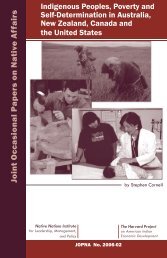American Indian Self-Determination - Native Nations Institute ...
American Indian Self-Determination - Native Nations Institute ...
American Indian Self-Determination - Native Nations Institute ...
- No tags were found...
You also want an ePaper? Increase the reach of your titles
YUMPU automatically turns print PDFs into web optimized ePapers that Google loves.
JOPNA Working Papersof the state citizenry. The vast majority of U.S. Congressional Districtsdo not encompass <strong>Indian</strong> reservations, and 19 states have no federallyrecognizedtribes within them.To be sure, there are some well-known instances in which the <strong>Indian</strong>vote has been important, perhaps even determinative, of electoral outcomes.In the case of the election of Senator Timothy Johnson (Democrat)of South Dakota by 524 votes in 2002, for example, the <strong>Indian</strong>vote on some reservations was so concentrated at more than 90 percentin favor of Johnson that ultimately unsubstantiated concerns of electoralfraud were raised by the media. Similarly, a concentrated <strong>Indian</strong>vote played a role in 2000 in the removal by less than 2,300 votes ofSenator Slade Gordon (Republican) of Washington state, long seen ashostile to <strong>Indian</strong>s for his Senate votes and for his prior, long-runningengagement as an opposing attorney in Pacific Northwest tribes’ assertionsof treaty fishing rights. While newsworthy, these cases stand outprecisely because they are so rare.It is true that the party affiliation of the <strong>Native</strong> electorate is predominantlyDemocratic, 49 and discussions in the mainstream media commonlyportray support for <strong>American</strong> <strong>Indian</strong>s as a liberal cause. Theseperceptions, however, miss more subtle strains of support and influence.Late Senator Barry M. Goldwater of Arizona, frequently citedas “Mr. Conservative,” and the Republican presidential candidate in1964, is still remembered by tribes in Arizona as a strong and early supporterof nascent pushes by tribal leaders for economic self-sufficiencyand local tribal self-rule. The legacy in which Republicans are seenas strong supporters of tribal sovereignty persists in the state, with aformer chairman of the Hopi Tribe, one of Arizona’s most traditional,serving in 2008 as the national chairperson of <strong>Indian</strong>s for (Republicanpresidential nominee John) McCain. In fact, Senator McCain served aschair of the Senate Committee on <strong>Indian</strong> Affairs in 1995-96 and 2005-06, and was regarded by tribes as generally quite strong in his supportfor policies of self-determination (even if he was seen as less supportiveon issues of federal spending on <strong>Indian</strong> matters). The Committee wasalso chaired over 1997-01 and 2003-05 by Senator Ben NighthorseCampbell, Democrat-turned-Republican from Colorado and, himself,the only <strong>American</strong> <strong>Indian</strong> (Northern Cheyenne) to serve in the Senatein the era of self-determination. Tellingly, the federal legislative foundationsof tribal self-determination, including Public Law 95-638 and22







